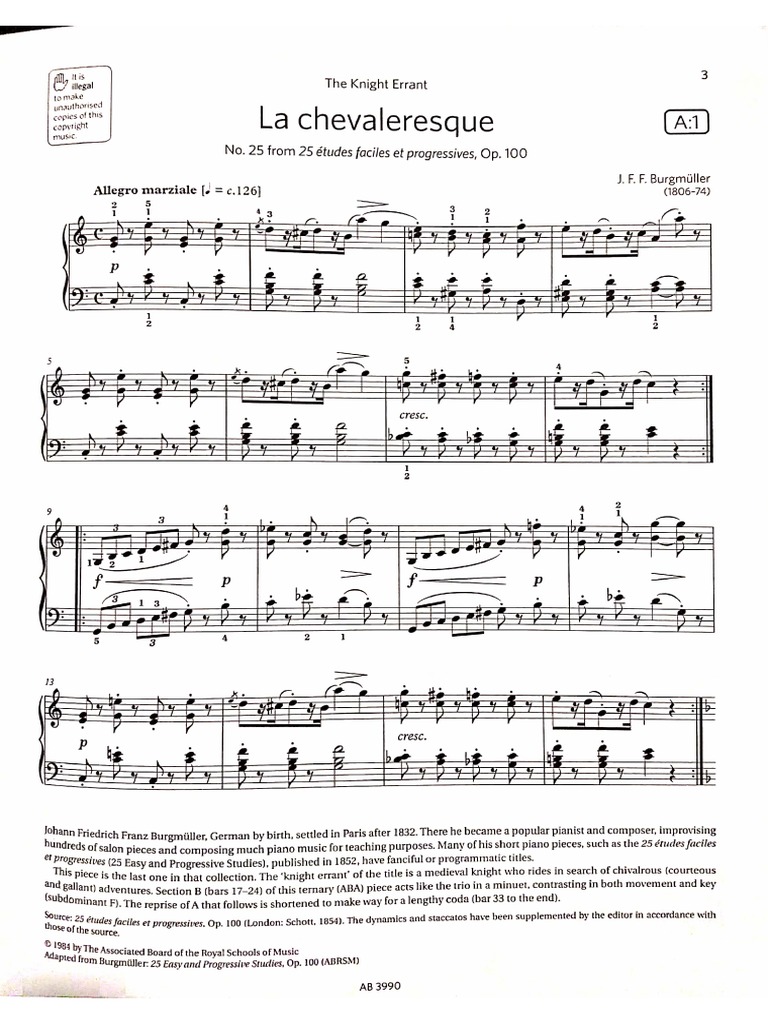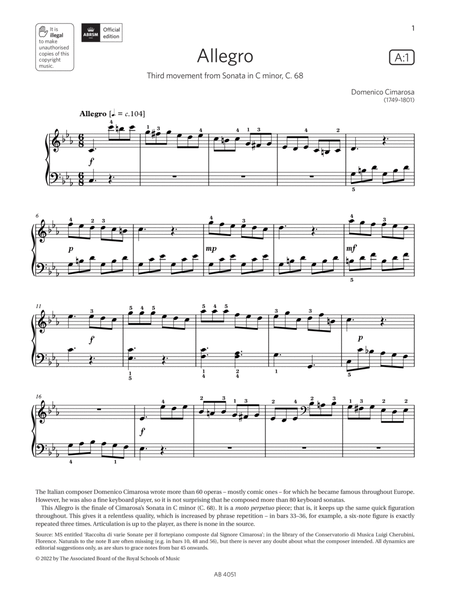Grade 5 piano is challenging but achievable with consistent practice. It requires a good understanding of complex musical pieces.
Embarking on the Grade 5 piano journey signifies a commitment to honing one’s skills in a world where musical mastery is both celebrated and pursued with passion. With this level acting as a milestone, students often experience a steep learning curve as they delve into more sophisticated compositions and techniques.
Mastery at this stage sets an aspiring musician apart, showcasing their dedication to the craft. It calls for a deeper theoretical knowledge, refined technical proficiency, and an expressive touch. As with any musical endeavor, personal aptitude and the quality of instruction play pivotal roles in determining the ease or difficulty faced by the student. Navigating the intricacies of Grade 5 piano is a worthy challenge for any dedicated student looking to elevate their musical prowess.

Credit: www.scribd.com
Breaking Down Grade 5 Piano Difficulty
Welcome to our deep dive into the world of Grade 5 piano. Piano enthusiasts often view Grade 5 as a pivotal milestone in their musical journey. With each step up in grade level comes a fresh set of challenges. Here, we’ll break down why Grade 5 piano is particularly challenging and what skills pianists need to conquer it.
!– Comparing Grade 1 To Grade 5 Progression —
Grade 1 piano players are just starting out. They learn simple melodies with one hand. Grade 5 is much harder. You play complex tunes with both hands. The leap from Grade 1 to Grade 5 is like jumping from learning your ABCs to reading a chapter book. Let’s look at the key differences:
| Aspect | Grade 1 | Grade 5 |
|---|---|---|
| Skills | Basic hand position | Dynamic techniques |
| Music Theory | Simple notation | Advanced notation |
| Repertoire | Simple tunes | Classical pieces |
!– Essential Skills For Grade 5 Mastery —
To master Grade 5 piano, several important skills are necessary. Students must develop not only technical abilities but also a deeper understanding of music itself.
- Scale Proficiency: Students should play scales quickly and accurately.
- Articulation: This includes legato, staccato, and everything in between.
- Rhythm Mastery: Complex rhythms need to be second nature.
- Expressiveness: Playing with emotion makes music come alive.
- Sight-Reading: The ability to read music at first glance is key.
Mastering these skills at Grade 5 shows significant progress. Skilled pianists can then explore even richer musical landscapes.

Credit: www.sheetmusicplus.com
Technical Challenges At Grade 5
Achieving success with Grade 5 piano means mastering several technical feats uncommon in earlier levels. A pivotal stage in musical training, Grade 5 introduces complexities that serve as a bridge to more advanced techniques. Technical prowess now takes the spotlight.
Scale Complexity And Speed
Scale mastery becomes vital at Grade 5. Not just playing the correct notes, but doing so with precision and speed. It requires diligent practice to gain agility and fluency. Consider these factors:
- Increased scales: Students encounter a broader variety of scales including chromatic and contrary motion.
- Faster tempos: The expected speed escalates, calling for a fast finger response without sacrificing accuracy.
| Scale | Octaves | Tempo |
|---|---|---|
| C Major | 2 | Allegro |
| B Flat Major | 2 | Vivace |
Musical expression cannot be overlooked despite the focus on speed.
Intricacies Of Hand Coordination
Hand-independence takes the forefront, with pieces featuring complex rhythms and syncopations. Young pianists now encounter:
- Polyrhythms: Opposing rhythms between hands demand keen focus.
- Counterpoint: Playing multiple melodic lines simultaneously.
- Fingering precision: Correct finger placement is crucial for smooth transitions.
Coordinating hands while maintaining musicality is key.
Regular practice and meticulous attention to detail enable Grade 5 students to overcome these challenges.
Repertoire Diversity In Grade 5
Grade 5 piano offers a rainbow of musical styles to play and learn from. This level introduces students to the challenge and beauty of a vast repertoire. A broad selection of music from classical sonatinas to jazzy pieces awaits every learner. Let’s dive into the diversity this level offers.
Classical Pieces Requirements
At Grade 5, students must sharpen their skills with classical pieces.
- Baroque to Romantic: Players will encounter composers like Bach, Haydn, and Tchaikovsky.
- Form and Expression: Understanding sonatinas and character pieces becomes essential.
- Technical Skills: Smooth scales, arpeggios, and ornamentation are crucial.
Grasping these elements is key to a solid classical performance.
Exploring Different Music Genres
Grade 5 opens doors to new music genres. This variety helps students become versatile pianists.
| Genre | Description | Examples |
|---|---|---|
| Jazz & Blues | Syncopation and improvisation take center stage. | Easier pieces by Gershwin or Joplin. |
| Contemporary | Modern rhythms and harmonies provide a fresh challenge. | Simple works by Einaudi or Mier. |
| Folk Tunes | Lively rhythms and melodies reflect cultural stories. | Arrangements of traditional songs. |
Grade 5 students will explore each genre, gaining a broad appreciation for music.
Credit: musescore.com
Sight-reading And Aural Tests
Mastering the Grade 5 Piano involves two key skills: sight-reading and aural ability. These components test musicianship and adaptability. Students encounter increased complexity in the music they must sight-read. Aural tests measure their musical ears. Let’s dive into what these tests demand at Grade 5.
Elevated Sight-reading Expectations
The leap to Grade 5 sight-reading is significant. Students must quickly grasp more notes and rhythms.
- Expect two sharps or flats in keys.
- Rhythms include dotted notes and triplets.
- Hands play together more often.
Reading ahead and keeping a steady tempo are vital skills. The right techniques make this challenging task manageable. Practice is the key to success.
Aural Skills Assessment Breakdown
Aural tests at Grade 5 aim to assess key musical skills. There are four parts to this test.
| Part | Component | Description |
|---|---|---|
| 1 | Melody Playback | Listen and play back a melody. |
| 2 | Rhythm Clapping | Clap back rhythm patterns. |
| 3 | Singing Notes | Sing top/middle/bottom notes from chords. |
| 4 | Musical Features | Identify dynamics and articulation. |
Preparing for these tests strengthens your listening and response times. Regular aural practice is essential.
Preparing For A Grade 5 Piano Exam
Reaching Grade 5 in piano marks a milestone. It brings new musical challenges. Mastery involves dedicated practice and mental readiness. Success requires organization, strategy, and confidence.
Strategies For Effective Practice
- Set realistic goals – Break down pieces into manageable sections.
- Slow practice makes perfect – Start slowly, increasing speed with accuracy.
- Use a metronome – Maintain consistent timing and rhythm.
- Focus on difficult parts – Repeat challenging measures.
- Memorize strategically – Memorize bars and phrases, not just notes.
- Record yourself – Listen back for mistakes and improvements.
- Schedule regular practice – Consistent, daily sessions are key.
Adapting To Performance Pressure
Grade 5 exams not only test skill but the ability to perform under pressure. Develop a calm mindset with these tips:
- Practice performance – Perform in front of friends and family.
- Visualize success – Imagine a positive exam experience.
- Breathe deeply – Use breath to reduce tension.
- Stay focused – Concentrate on the music, not the audience.
- Build resilience – Learn from mistakes without dwelling on them.
- Mock exams help – Simulate exam conditions at home.
Resources And Support For Students
Embarking on the Grade 5 piano journey brings unique challenges and triumphs. Success hinges on the right resources and support. Every student deserves access to tools that enhance learning and performance. Explore essential materials and expert guidance to master the Grade 5 piano syllabus effectively.
Recommended Study Materials And Books
Grade 5 piano requires a strategic approach. Quality study materials and books form the backbone of effective preparation. Here are top recommendations:
- ABRSM Grade 5 Book: Essential pieces and exercises.
- Music Theory in Practice: Fundamental concepts.
- Piano Exam Pieces: Diverse repertoire selections.
- Scale Mastery: Focused scale practice.
- Sight-Reading Books: Progress with confidence.
Select books that match your learning style. Engage with diverse musical pieces to boost skill and enjoyment.
Finding The Right Piano Teacher
Personal guidance simplifies complex music challenges. A suitable piano teacher accelerates progress. Consider these points when choosing:
| Criteria | Why It Matters |
|---|---|
| Experience | Expertise with the Grade 5 syllabus. |
| Teaching Style | Match with your learning preferences. |
| Student Reviews | Insights into teaching effectiveness. |
| Availability | Convenient lesson scheduling. |
Ask potential teachers about their approach to Grade 5 challenges. Their responses reveal suitability for your journey.
What Is The Level of Difficulty Between Grade 4 and Grade 5 Piano?
The grade 4 piano difficulty level tends to involve more complex rhythms, scales, and arpeggios compared to grade 5. In grade 5, the difficulty level increases with more challenging pieces, advanced techniques, and greater emphasis on musical expression. Students transitioning from grade 4 to grade 5 may notice a noticeable jump in complexity.
Can Playing Grade 8 Piano Pieces Help Me Understand the Difficulty of Grade 5 Piano?
Exploring the grade 8 piano repertoire list can significantly enhance your understanding of grade 5 piano challenges. By tackling more complex pieces, you’ll develop advanced techniques and musicality. This broader perspective not only improves your skills but also deepens your appreciation for the foundational elements present in grade 5 music.
Frequently Asked Questions Of How Hard Is Grade 5 Piano
How Long Does It Take To Grade 5 On Piano?
Achieving Grade 5 on piano typically takes about 3 to 5 years of consistent practice. This varies based on individual learning pace and practice frequency.
Is It Hard To Pass Grade 5 Piano?
Passing Grade 5 piano can be challenging, but with dedicated practice and good instruction, students often succeed. Skill level, practice habits, and natural musicality play significant roles in determining the difficulty.
What Is Grade 5 Piano Equivalent To?
Grade 5 piano is generally considered intermediate level, equivalent to ABRSM Grade 5 or a high school freshman’s music proficiency.
What Is The Average Age For Grade 5 Piano?
The average age for Grade 5 piano students is typically between 10 and 11 years old. This can vary based on individual progress and practice.
Conclusion
Mastering Grade 5 piano is a rewarding journey of musical progression. It requires dedication, practice, and passion. By setting realistic goals and seeking guidance, students can surmount its challenges. Embrace the process, celebrate each milestone, and watch your skills harmoniously flourish.
